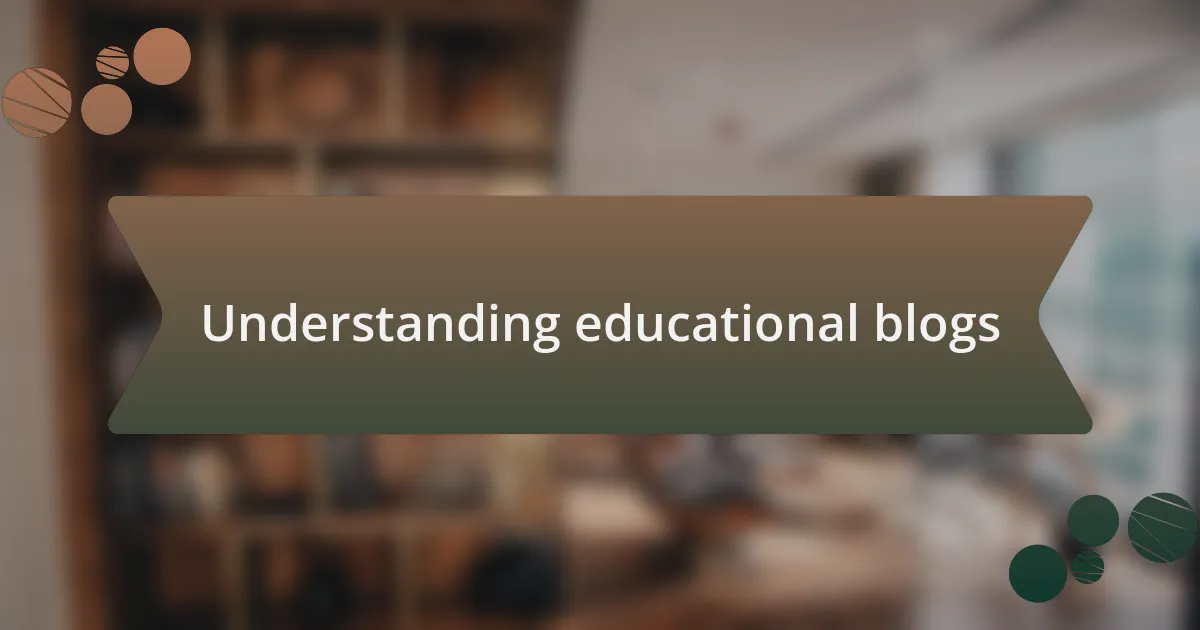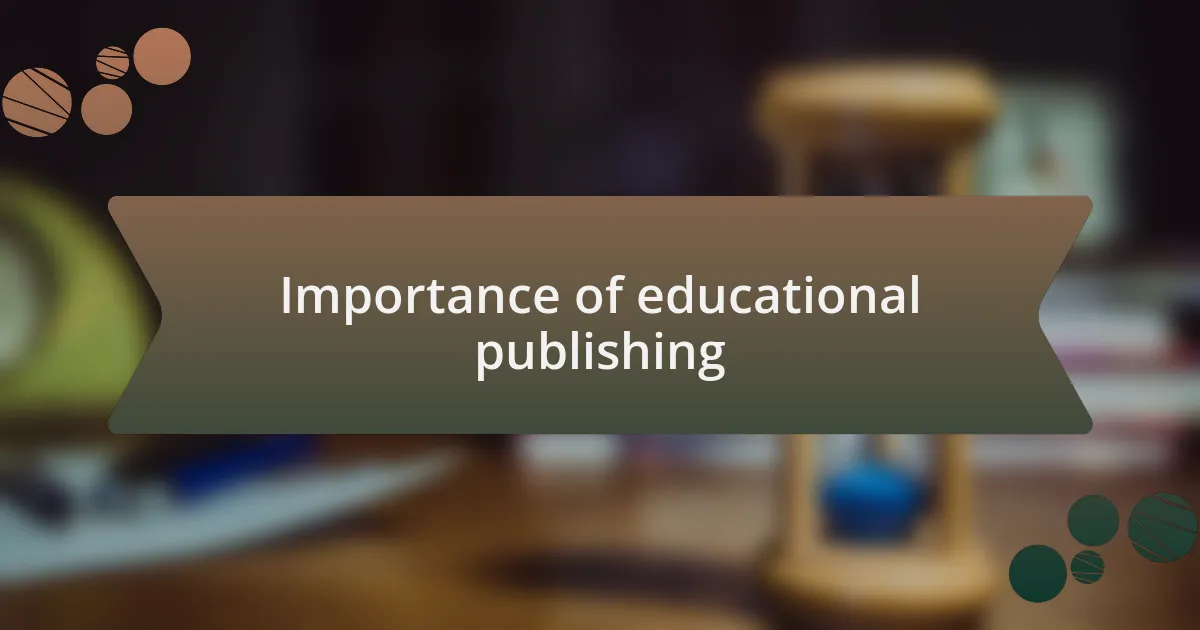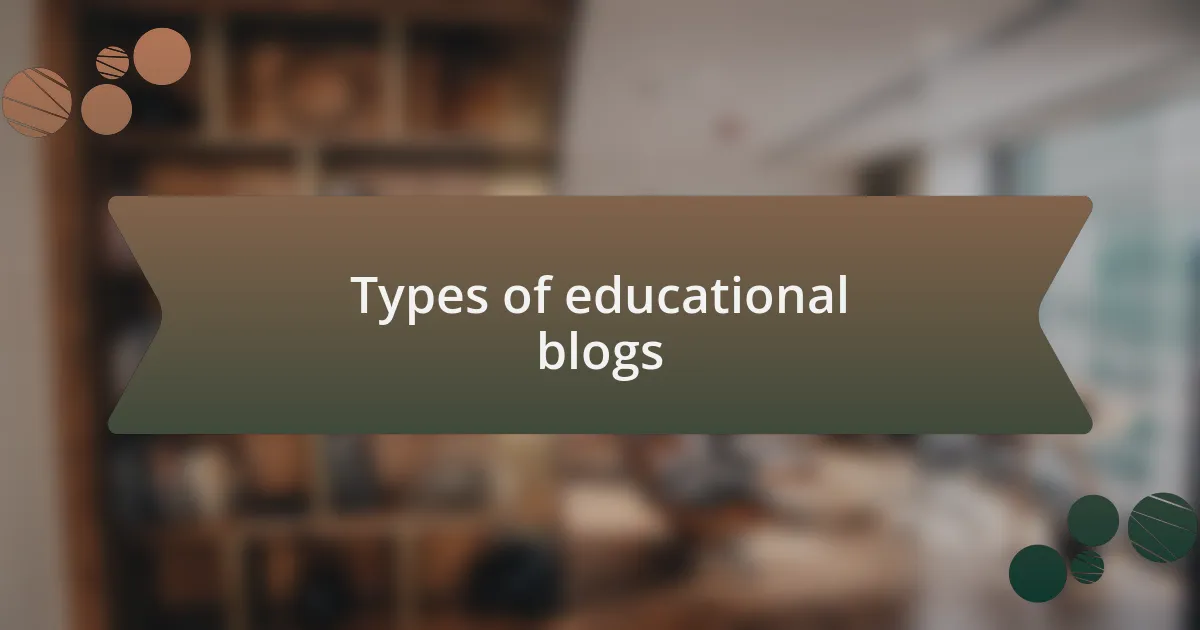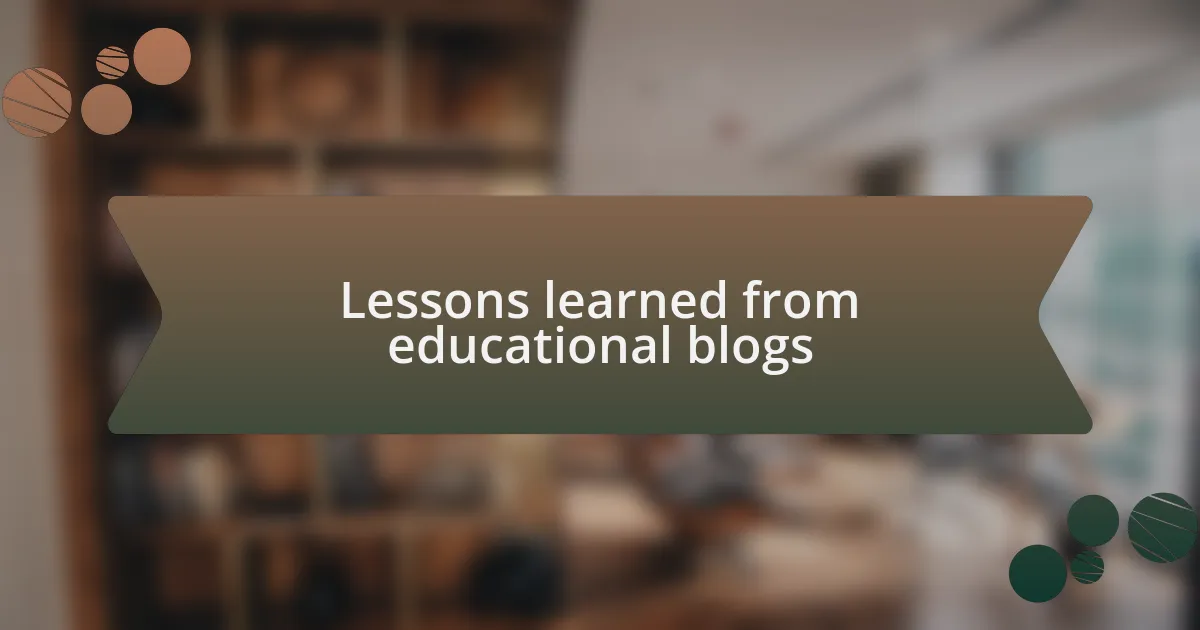Key takeaways:
- Educational blogs connect educators, students, and lifelong learners, fostering community and sharing diverse perspectives.
- Educational publishing promotes inclusivity and innovation, significantly impacting teaching practices and learning experiences.
- Different types of educational blogs, such as lesson plans, subject-specific blogs, and personal reflections, provide varied resources and insights for educators.
- Personal narratives and community engagement within educational blogs inspire experimentation and transformation in teaching approaches.

Understanding educational blogs
Educational blogs are dynamic platforms that connect educators, students, and lifelong learners. I still remember the first time I stumbled upon one while searching for teaching strategies; it felt like I had discovered a treasure trove of ideas! Have you ever found information online that completely reshaped the way you approach a subject? That’s the magic of educational blogs—they inspire new perspectives.
These blogs not only share valuable resources, but they also foster community. I’ve engaged in discussions within comment sections that broadened my understanding of complex topics. It’s like sitting in a virtual classroom, where everyone learns from each other’s experiences. Don’t you think that kind of interaction enhances the learning process?
Moreover, educational blogs often reflect the personal journeys of their authors, making the content all the more relatable. I recall reading a post about a teacher’s struggles with classroom management and how they turned those challenges into learning opportunities. How inspiring is that? The blend of personal anecdotes and practical advice creates a rich tapestry of knowledge that anyone in the education field can appreciate.

Importance of educational publishing
Educational publishing serves as a cornerstone for disseminating knowledge and shaping educational practices. I remember my excitement when I discovered an educational publisher that provided open-access resources; it felt like unlocking a vault of understanding previously out of reach. Have you ever encountered a resource that suddenly made a complex topic clear? That’s the power of well-curated educational materials—they can completely transform learning experiences.
The importance of educational publishing also lies in its ability to promote inclusivity. Through diverse voices and perspectives, it allows for a broader understanding of different cultures and methodologies. I still hold onto a textbook that introduced me to various teaching styles worldwide; it broadened my horizons and helped me appreciate different approaches. Isn’t it fascinating how one book can create connections that transcend borders?
Additionally, educational publishing encourages innovation by constantly evolving in response to the needs of learners and educators. I once attended a workshop where a publisher showcased interactive e-books that engaged students like never before. How could anyone argue against the potential of technology to revolutionize how we learn? With each new development, we are reminded that educational publishing isn’t just about sharing knowledge; it’s about inspiring future generations.

Types of educational blogs
Educational blogs come in various types, each serving different purposes in the realm of learning. For instance, I once stumbled upon a blog dedicated to lesson plans and teaching strategies that transformed my approach to classroom engagement. Isn’t it incredible how a simple format like a blog can provide a wealth of innovative teaching ideas that spark excitement in both educators and students?
Another type that stands out is the subject-specific blog, which delves into particular areas of study, offering in-depth analysis and resources. I remember reading a math-focused blog that not only broke down complex concepts but also incorporated real-world applications. Have you ever found a resource that made you see a subject from an entirely new angle? That’s what these specialized blogs do—they ignited a passion for the subject in me that I didn’t know existed.
Finally, there are personal reflection blogs where educators share their journey, challenges, and triumphs. I often revisit a blog written by a teacher navigating the highs and lows of their first year in the profession. Those candid reflections resonated with me and reminded me that teaching is a shared journey filled with ups and downs. How powerful is it to connect with someone’s story, knowing you’re not alone in the challenges you face?

My journey discovering educational blogs
My journey discovering educational blogs truly began when I found myself lost in the vast online world of teaching resources. One evening, after a tiring day in the classroom, I stumbled upon a blog filled with vibrant anecdotes and practical tips. I felt an instant connection, as if the author were speaking directly to me, sharing their struggles and victories. Have you ever felt that spark of inspiration that pushes you to rethink your approach? That moment changed everything for me.
As I explored further, I encountered a network of educators who shared their expertise and passion through their blogs. I remember reading a post about incorporating technology into lesson plans, which prompted me to experiment in my own classroom. I had this “aha” moment while attempting a new digital tool that truly engaged my students; their excitement was infectious. Isn’t it amazing how a simple blog can lead to hands-on experiences that rejuvenate your teaching?
In my journey, personal reflection blogs became a refuge for me. I came across a heartfelt entry from a veteran teacher describing their transition from traditional to progressive teaching methods. I found myself nodding along, relating to their challenges, aspirations, and fears. The raw honesty in their writing reminded me that every educator has a story, and our experiences unite us in this challenging, yet rewarding profession. How often do we find solace in shared narratives, knowing we’re part of a larger community?

Lessons learned from educational blogs
Reflecting on my journey through educational blogs, I’ve learned that the power of narrative can profoundly impact teaching practices. I remember a post that vividly described a teacher’s initial struggles with classroom management. Their journey from chaos to calm inspired me to rethink my own approach. It struck me—how often do we underestimate the value of sharing our failures?
Another insight I’ve gained is the importance of community within the blogosphere. I once participated in a discussion thread sparked by a blog post about inclusive teaching strategies. The varied perspectives shared by other educators opened my eyes to methods I had never considered, expanding my toolkit and enriching my practice. Isn’t it fascinating how a blog can connect us to a vast network of ideas and support?
Finally, educational blogs have taught me the significance of experimentation. After reading about a creative project involving student-led discussions, I decided to implement it in my classroom. The enthusiasm and confidence it cultivated among my students were a revelation. Have you ever tried something new and found it transformed not just your lesson, but your entire outlook on teaching?